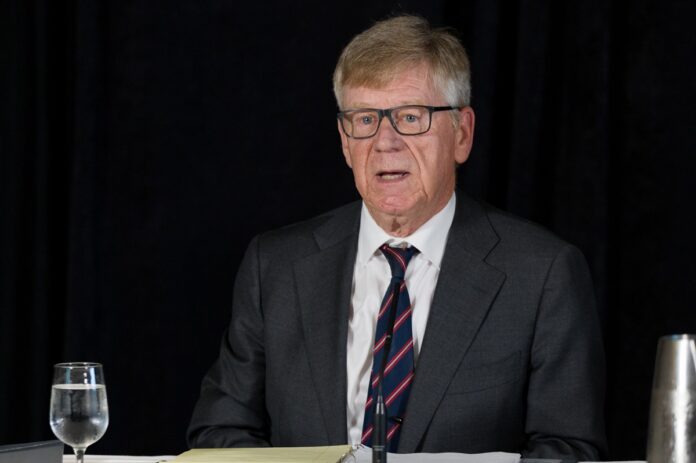(RCMP bosses in their cozy digs in Ottawa were quite obviously least bothered about British Columbia. The arrogant Mounties just made token efforts and snubbed B.C. politicians as in evident from these findings.)
FORMER B.C. Supreme Court Justice Austin Cullen has slammed the RCMP in his final report on money laundering in B.C.
Under the heading “The RCMP’s lack of attention to money laundering has allowed for the unchecked growth of money laundering since at least 2012,” the Executive Summary of the final report that was released on Wednesday, states that “without a dedicated unit, RCMP money laundering investigations were subject to the federal prioritization process and were weighed against other pressures and priorities, such as national security.”
The result was that money laundering and proceeds of crime investigations were given very little attention. Important investigations in British Columbia, including the investigation into money laundering at BC casinos, were terminated.
In spite of repeated requests, after 2012 there was no enforcement body available to address the casino problem. Consequently, “the volume of suspicious cash entering BC casinos rose to unprecedented levels.”
Here’s the Executive Summary on this aspect:
Prior to 2012, the RCMP maintained some capacity and expertise to pursue money laundering and proceeds of crime investigations. A shift in focus in 2012 largely eliminated that capacity and expertise, leaving, for the next decade, a glaring enforcement gap. This gap left money laundering to proliferate in this province, largely unchecked.
From 1990 to 2012, the RCMP maintained Integrated Proceeds of Crime (IPOC) units in each province. These units were responsible for the most serious money laundering and proceeds of crime investigations. They developed a high level of expertise and were critical to the federal government’s strategy to combat organized crime.
In 2011, the officer-in-charge of the British Columbia IPOC unit became concerned about the large volume of $20 bills being received by BC casinos and initiated an investigation. The investigation revealed substantial amounts of cash entering BC casinos, which the investigators believed were from criminal activity. These investigators also correctly identified the typology being used to launder this cash – a group of cash facilitators were loaning large sums of cash to high-limit gamblers, who often paid back the debt using a cross-border value and payment transfer system, which allows for cash to be advanced in one country and the debt repaid in another.
In 2012, the federal government made significant cuts to government services and disbanded the IPOC units. This left no enforcement body with primary responsibility to investigate money laundering or proceeds of crime in this province. The disbandment of the IPOC units was a pivotal moment, which allowed for the unchecked growth of money laundering in the gaming industry and other sectors of the economy for the better part of a decade.
Without a dedicated unit, RCMP money laundering investigations were subject to the federal prioritization process and were weighed against other pressures and priorities, such as national security. This resulted in money laundering and proceeds of crime investigations being given very little attention. Important investigations in British Columbia, including the investigation into money laundering at BC casinos, were terminated.
After 2012, despite repeated requests, there was no enforcement body available to address the casino problem, and the volume of suspicious cash entering BC casinos rose to unprecedented levels.
In 2015, the BC Lottery Corporation (BCLC), in part by leveraging a personal relationship, was finally able to convince the Federal Serious and Organized Crime (FSOC) section of the RCMP to start an investigation. In that year, BCLC reported over $183 million in suspicious transactions to FINTRAC. Shortly into its investigation, FSOC was able to make a direct link between the suspicious cash being provided to patrons at the River Rock Casino Resort and an unlicensed money services business in Richmond.
The investigation uncovered evidence suggesting that upwards of $220 million in illicit funds was being moved through this single money services business each year.
Unfortunately, this one investigation was an anomaly. There was no sustained effort to investigate money laundering activity in British Columbia. Between 2015 and 2020, there were only two other major money laundering investigations that progressed to the charge-approval stage. This level of attention by the RCMP to money laundering is not commensurate with the money laundering activity and risks in this province.
Cullen Commission Final Report:













